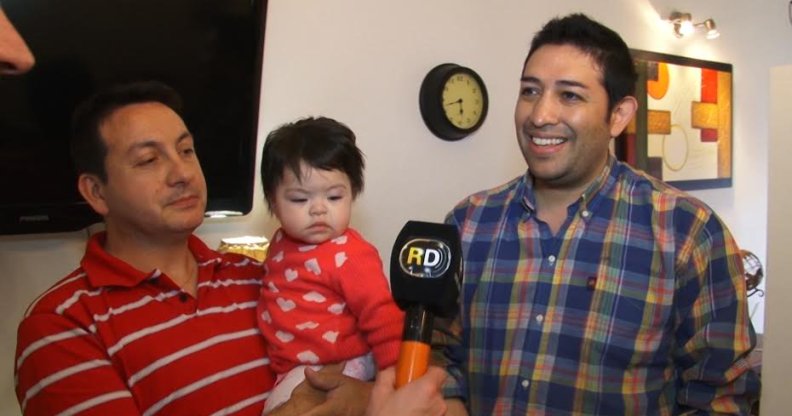Gay couple adopts baby living with HIV after she was rejected by 10 other families

Damian Pighin and Ariel Vijarra with their daughter Olivia (Twitter)
A gay couple in Argentina have adopted a baby that was rejected by 10 other families because she is HIV positive.
Damian Pighin and Ariel Vijarra decided to adopt as far back as 2011, and in 2014 they received a call to say that a newborn baby was ready to join their family, UNILAD reports.
The girl had been born with HIV and had tragically been rejected by 10 other families.
But her HIV-status did not matter to Pighin and Vijarra. Speaking to local media, Ariel said that he knew she was meant to be part of his life as soon as he saw her.
“The connection was immediate. We held her in our arms, gave her the bottle and she looked at us with her eyes wide open without crying,” he said.
Their daughter is on treatment and the virus is now undetectable.
The girl – who is called Olivia – is now on treatment for HIV and the virus is now undetectable as a result.
A year later, a woman approached them and said she had heard about their story and wanted them to adopt her daughter too. They agreed and shortly afterwards welcomed their second daughter Victoria into the world.
The connection was immediate. We held her in our arms, gave her the bottle and she looked at us with her eyes wide open without crying.
The couple works for a non-governmental agency called Acunar Familias which translates as Cradle Families where they help couples adopt children.
The heartwarming story comes just months after a new study, called PARTNER2, proved that there is zero risk of transmitting HIV while on antiretroviral treatment.
HIV is untransmittable when on effective treatment
The study was published in The Lancet in May and investigated almost 1,000 gay male couples who did not use condoms across Europe over more than eight years where one partner had the virus.
Over the course of eight years, just 15 of the HIV-negative men involved contracted the virus – however researchers were able to confirm through genetic testing that none of those men contracted the virus from their partner.
Meanwhile, researchers at Temple University’s Lewis Katz School of Medicine revealed in September that they had “functionally cured” mice carrying the HIV virus.
The mice were given a “long-acting slow-effective release” form of antiretroviral therapy as a part of the treatment. The researchers also used a gene editing tool to extract the remnants of the virus.

